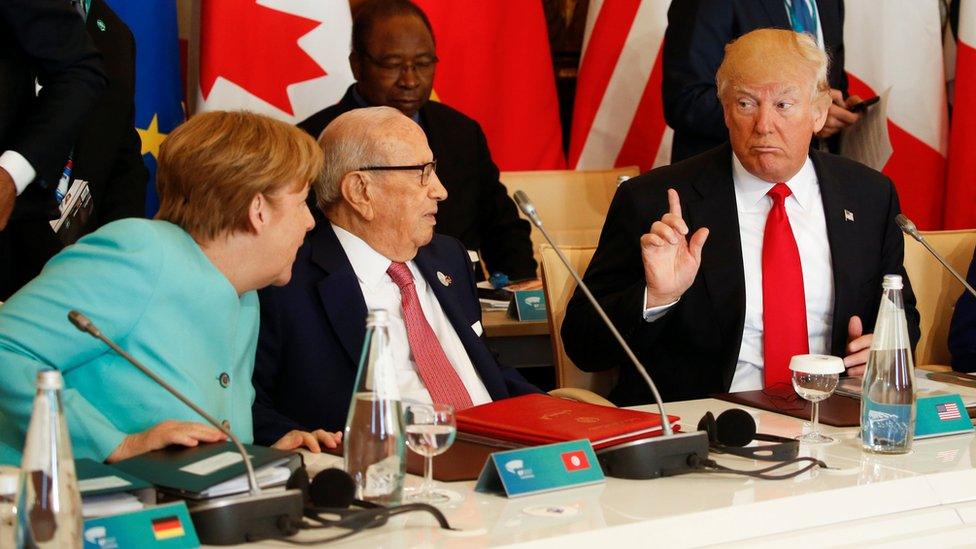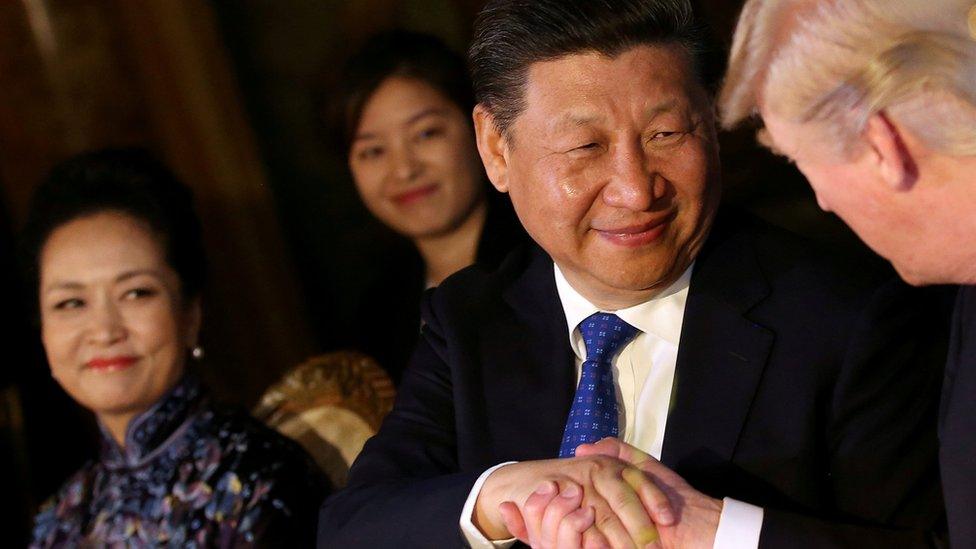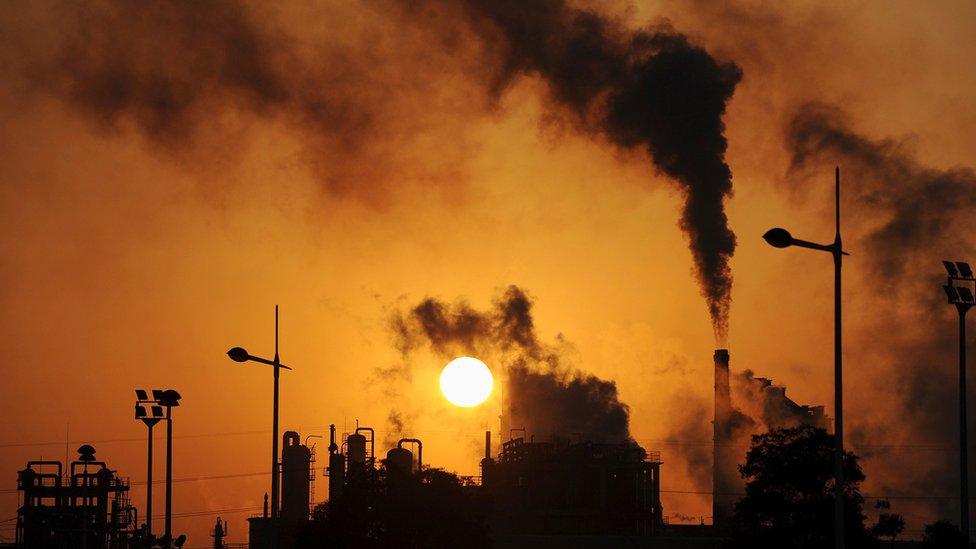Is Trump abandoning US global leadership?
- Published
Trump: The world won't laugh any more at US
What is Donald Trump's vision of American leadership? His inaugural speech gave us a headline - "from this day forward, it's going to be only America first" - but four months on, how much more do we know?
Amid a flood of stories about the president's lack of commitment to cherished post-war alliances, his attitude to trade and his unwillingness to collaborate on issues like climate change, Mr Trump's critics draw pessimistic conclusions.
"The cumulative effect of Trump policies, capped by his foolish, tragic Paris decision = abdication of America's global leadership. Shame!" tweeted Susan Rice, Barack Obama's former national security adviser.
"Donald Trump's every instinct runs counter to the ideas that have underpinned the post-war international system," writes G John Ikenberry, Professor of Politics and International Affairs at Princeton.
"Across ancient and modern eras, orders built by great powers have come and gone," he writes in Foreign Affairs, external. "But they have usually ended in murder not suicide."
However, in the wake of President Trump's first, much scrutinised foreign trip, two of his closest aides argued that America's allies have nothing to fear.
"America First does not mean America alone," wrote White House National Security Adviser HR McMaster and National Economic Council Director Gary Cohn in the Wall Street Journal, external.
The president, they insisted, had reconfirmed America's commitment to the Nato principle of collective defence (there is a debate about this: his endorsement was less than explicit). Using a pejorative phrase often thrown at Barack Obama, the authors said America would not "lead from behind".
They also made it clear that the president's approach is fundamentally transactional and highly competitive.

Donald Trump found himself out of step with other leaders at the G7 summit in Italy
They hailed Donald Trump's "clear-eyed outlook that the world is not a 'global community' but an arena where nations, non-governmental actors and businesses engage and compete for advantage".
Where America's interests align with those of its friends and partners, they wrote, the administration was open to working together to solve problems.
But the two officials signed off with an unambiguous reminder of their master's core purpose.
"America First signals the restoration of American leadership and our government's traditional role overseas - to use the diplomatic, economic and military resources of the US to enhance American security, promote American prosperity, and extend American influence around the world."
No place here, it seems, for Harry Truman's 1945 declaration that "no matter how great our strength... we must deny ourselves the license to do always as we please".
For Donald Trump, the exercise of American influence revolves around imposing Washington's will.
Muscular approach
"We must make America respected again and we must make America great again," he declared in April 2016.
"If we can do that, perhaps this century can be the most peaceful and prosperous the world has ever known."
Some of the president's fiercest critics reacted with horror to the McMaster/Cohn article.
The conservative commentator David Frum said the two officials "have re-imagined the United States in the image of their own chief - selfish, isolated, brutish, domineering, and driven by immediate appetites rather than ideals or even longer-term interests."
There were times, during the European leg of his tour, when the president's body language and demeanour seemed calculated to confirm his opponents' worst fears.
In May 2017 Donald Trump pushed aside Montenegro's prime minister and dressed down Nato leaders
When he shoved aside the prime minister of Montenegro, Donald Trump seemed to act out an ugly version of America First.
A billionaire who is used to bending friend and foe alike to his will appears to struggle with anything more collaborative.
But there are signs that his muscular approach, while popular among supporters at home, has already caused a shift in the tectonic plates of the global world order.
Germany's Angela Merkel says the days of depending on others are "to a certain extent" over.
"We Europeans truly have to take our fate into our own hands," she told supporters last Sunday.
She struck a similar note when welcoming the Chinese Premier Li Keqiang to Berlin.
"We are living in times of global uncertainty," she said, "and see our responsibility to expand our partnership… and push for a world order based on law."
For his part, Mr Li seemed only too happy to reciprocate.
"We are both ready to contribute to stability in the world," he said.
It's been clear since Donald Trump's election that China sees this as a moment of opportunity.
China is not being pushy, foreign ministry official Zhang Jun told reporters in January.

Chinese President Xi Jinping has committed his country to renewable energy
"It's because the original front-runners suddenly fell back and pushed China to the front," he said.
At the World Economic Forum in Davos it was left to China's President Xi Jinping to defend globalisation and free trade, both frequently and colourfully attacked during Donald Trump's election campaign.
The EU and Nato also came in for scorn, and even though President Trump has subsequently moderated his tone, damage has undoubtedly been done.
David Frum reaches a bleak conclusion. America is no longer the leader its partners once respected "but an unpredictable and dangerous force in world affairs, itself to be contained and deterred by new coalitions of ex-friends".
- Published1 June 2017

- Published31 May 2017